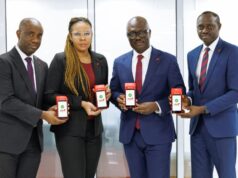LAGOS, AUGUST 7, 2018 – Ife Ogunfuwa examines how huge investments in software by Nigerian banks are shaping the delivery of innovative banking products to drive efficient financial transactions and guard against cyberattacks.
A total of seven Deposit Money Banks reported fresh investments worth N8.58bn in software in the first three months of the year in order to deliver seamless banking services to customers.
Findings by The PUNCH showed that in the first quarter of the previous year, the same banks spent N8.22bn on computer software developed within and outside the country.
The banks surveyed are Access Bank Plc, First City Monument Bank Limited, Guaranty Trust Bank Plc, Sterling Bank Plc, Zenith Bank Plc, Ecobank Transnational Incorporated (the parent company of Ecobank Nigeria) and Jaiz Bank Plc.
Experts note that software, which forms a critical asset of the financial institutions to carry out transactions and protect customers’ funds, is usually upgraded every four to five years.
Commercial banks in the country have increasingly deployed technology to ease banking transactions, with many of them recently introducing chatbots on their social media platforms, including banking services on WhatsApp.
An analysis of the first quarter unaudited annual reports of the banks ending March 31, 2018 showed that the software procurement spending of Ecobank was the highest during the period, recording N4.32bn in the first three months of the year.
This amount represents 495 per cent of its increase in software investment as against N725.4m in the first quarter of the previous year.
To drive digital banking services, Access Bank deployed new software worth N2.62bn, against N2.57bn in the first quarter of the previous year.
Zenith Bank’s investment of N1.41bn in software in the first three months of the year reduced by 16 per cent compared to N1.68bn in the same period of 2017.
The GTB’s software purchase dropped by 97 per cent from N2.73bn spent in the first quarter of 2017 to N86.79m in the first three months of this year.
Jaiz Bank, which invested N139.33m in the procurement of software in the first three months of 2017, reported a reduction by 57 per cent in software spending (N59.39m) from January to March 2018.
According to the Sterling Bank’s financial statement, N7m was invested in procuring new software in the period under review as against N45m in the first quarter of 2017.
The FCMB’s spending on computer software dropped by 76 per cent from N329m in the first quarter of 2017 to N78.64m in the three months ended March 31, 2018.
The Managing Director, BCX, an end-to-end digital solutions company, Mr Ayo Adegboye, attributed the huge investments in banking technology to a change in customers’ behaviour as a result of an increase in Internet penetration, smartphone and technology adoption and the Central Bank of Nigeria’s cashless policy.
As such, he said banks were forced to redesign the delivery of their banking services, embrace digital and give new definition to customer experience.
According to him, the renewed demand for continuous innovation has to be delivered by software from reputable providers.
“These providers should be one that offer flexible and functional solutions that can be easily updated or upgraded without having to initiate overwhelming projects for upgrade task, which can often prevent or delay prompt update or upgrade,” Adegboye stated.
The BCX MD stressed that it was important for banking applications to be up-to-date so as to mitigate against the constant evolving threats facing financial institutions as they were mostly targeted by hackers stealing customers’ information or slowing down banking operations.
“It is crucial not to neglect update of banking software as it makes the system an easy target for cyberattacks. I know of some Original Equipment Manufacturers that publish security advisory notes to their partners, customers and distributors as often as required and provide software updates that address known vulnerabilities,” Adegoye added.
He said emerging technologies that would shape innovation in banks in the coming years were clouding computing, big data and analytics, robotics process automation, Artificial Intelligence and Internet of Things.
The Managing Director, Upperlink Limited, a software development firm, Mr Segun Akano, noted that banking operations had gone beyond brick and mortar, with customers preferring online transactions.
According to him, banks have been able to reduce investments in establishing branches and have started spending more on technology that will facilitate online transactions.
“Banking operations are going beyond the physical structures to online. And to offer efficient services online, they need to invest in software that will make it easy for customers to use. A lot of them use Microsoft servers and operating system, and they need to pay service charge yearly to vendors on their core banking software,” Akano said.
The Director General, National Office for Technology Acquisition and Promotion, Dr Ibrahim DanAzumi, said over 90 per cent of the country’s economy was supported by foreign software.
He said that NOTAP, as a regulatory agency saddled with the responsibility of regulating the inflow of foreign technologies into the country, was sad looking at the amount of money that was leaving the country as payment for foreign software.
To encourage indigenous development of software, DanAzumi said the agency introduced local vendor policy, whereby the foreign software developers must engage local vendors during deployment and maintenance of the software.
He added that the policy stipulated that since software agreement usually lasted for only one year, 40 per cent of the yearly maintenance fees must go to local software developers.
He stated that the idea behind the policy was to give the local software developers the financial leverage to engage in further research in order to upgrade their inventions to meet global standards.
The NOTAP DG further stated that some indigenous software developers had started enjoying the benefits of the policy.









